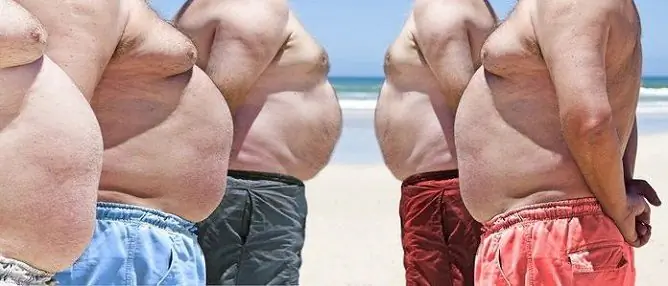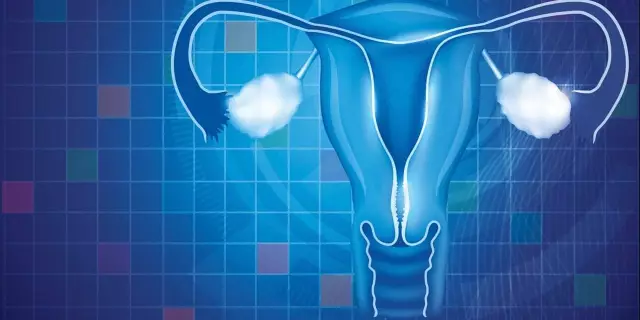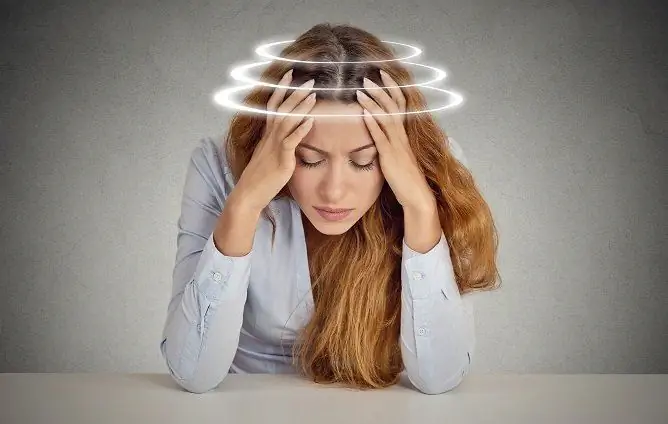- Author Rachel Wainwright wainwright@abchealthonline.com.
- Public 2023-12-15 07:39.
- Last modified 2025-11-02 20:14.
The norm of estradiol in men, causes, symptoms and correction of disorders
The content of the article:
- The norm of estradiol in men and the determination of the level of the hormone
- Causes of increased and decreased estradiol in men
- Symptoms of elevated estradiol in men
- How to lower estradiol in men
Estradiol in men is of no small importance for the normal functioning of the body, despite the fact that it is considered the main female hormone.

Increased estradiol levels in men lead to obesity
In the male body, estradiol promotes the production of ejaculate, improves the ability to fertilize, affects blood clotting, affects oxygen metabolism, regulates metabolic processes, and helps to strengthen bones. Estradiol promotes the production of high-density lipoproteins, thus reducing the risk of developing cardiovascular pathologies. It also has an impact on cognitive function.
The secretion of estradiol depends on the time of year - the highest concentration is observed in the fall, as well as on the time of day - the peak falls at 15:00. About 20% of the hormone is produced in Leydig cells in the testes, the rest is produced by aromatization of androgens (androstenedione and testosterone) in peripheral tissues. The activity of the aromatase enzyme, with the participation of which this process occurs, increases with age, as well as with weight gain. There is an inverse relationship between the concentration of estrogen and testosterone, i.e. the more estradiol, the less testosterone and vice versa.
The norm of estradiol in men and the determination of the level of the hormone
Normally, the content of estradiol in the blood in men should not exceed 56 pg / ml, however, the rate may differ in different laboratories, depending on the research method used.
Both an increase and a decrease in the level of estradiol in the blood negatively affects the health of a man.
An estradiol test is prescribed in the following cases:
- gynecomastia (breast enlargement in men);
- premature puberty;
- delayed sexual development;
- suspicion of genital neoplasms;
- osteoporosis.
To obtain the most reliable result for the study, you must properly prepare. Blood should be donated in the morning on an empty stomach (at least eight hours should pass from the last meal). A few days before blood sampling, it is necessary to stop drinking alcohol, fatty foods, physical activity and sexual contacts, and you should also refrain from smoking.
In addition to determining the concentration of estradiol in the blood, a study of the ratio of estradiol to testosterone may be required.
Causes of increased and decreased estradiol in men
Low blood levels of estradiol can be caused by:
- hypogonadism (testicular failure, characterized by a decrease in the concentration of sex hormones in the blood);
- disorders of the pituitary gland;
- inflammatory diseases of the genital organs;
- significant weight loss;
- bad habits;
- excessive physical activity;
- vegetarian diet;
- chronic prostatitis;
- heart disease;
- taking certain medications (for example, hormonal).
The increase in estradiol levels can be absolute or relative. The absolute is due to the excessive content of the hormone in the blood, and the relative is characterized by a change in the ratio of androgens and estrogens in favor of the latter.
An absolute increase in estradiol in males is characteristic of the following pathologies:
- estrogen-producing neoplasms (testicles, adrenal glands);
- tumors of the pituitary gland, liver, lungs;
- cirrhosis of the liver caused by alcoholic or viral hepatitis.
Other causes of elevated estradiol include:
- endocrine diseases;
- some hereditary pathologies (Klinefelter syndrome);
- renal or hepatic impairment;
- taking a number of medicines (some diuretics, androgenic drugs, opioids, anabolic steroids, etc.);
- exposure to the body of toxic substances and ionizing radiation;
- obesity;
- nutritional errors (abuse of beer, legumes, spicy and fried foods, excessive use of sugar and other carbohydrates);
- starvation;
- excessive physical and psycho-emotional stress.
Symptoms of elevated estradiol in men
An increased level of estradiol is observed in about 3% of cases of the total number of reproductive disorders in men.
Symptoms of high estradiol in men include:
- the formation of fatty deposits in the chest, buttocks, abdomen and thighs (female obesity);
- reduction in the amount of hair on the face and body;
- decreased libido;
- fast fatiguability;
- increased irritability;
- headaches;
- swelling;
- decrease in muscle mass;
- cooling of the upper and lower extremities.
With an excessive amount of estradiol in the body, disorders of the gastrointestinal tract are often observed (frequent constipation and / or diarrhea).
The lack of timely correction of high estradiol in men leads to the following consequences:
- erectile disfunction;
- reduction in the size of the genitals;
- gynecomastia (may be due to the effect of increased concentrations of estradiol on breast tissue or an increase in the sensitivity of target cells to estrogen);
- chronic cardiovascular diseases (arterial hypertension, myocardial infarction).
An increase in the concentration of estradiol in males contributes to the growth of the epithelium of the prostate gland, which can subsequently lead to the development of benign or malignant neoplasms of the prostate.
How to lower estradiol in men
The method of correcting estradiol depends on the cause of the disorder. With an increased concentration of estradiol in the blood, it is not recommended to self-medicate, as this is highly likely to only aggravate hormonal dysfunction.

Beer abuse leads to increased estradiol levels in men
With increased estradiol, due to the intake of drugs, withdrawal is usually sufficient to normalize the hormone level.
To reduce the increased level of estradiol, a lifestyle correction is necessary, and first of all, nutrition. Smoked, fatty, spicy foods should be excluded from the diet, and the use of sugar, animal fats and alcohol should be limited.
The daily diet should contain fresh vegetables, fruits and seafood, which are rich in omega-3 polyunsaturated fatty acids. Since elevated estradiol is often accompanied by excess weight, a reduction in calorie intake and fractional meals are recommended. Also, to normalize body weight, regular physical activity is shown, which, however, should not be excessive.
Drug therapy consists in taking drugs that have antiestrogenic effects. With metabolic disorders, antioxidants can be used, which can both lower estradiol in men and prevent the development of cardiovascular pathologies. If elevated estradiol is associated with endocrine diseases, hormone replacement therapy is usually performed. With an increase in the concentration of estradiol against the background of exposure to toxic substances, they resort to detoxification and hepatoprotective therapy.
Treatment of tumors that cause an increase in estradiol usually consists of surgery followed by hormonal therapy.
Gynecomastia, which develops against the background of increased estradiol, is corrected at the initial stages with the help of hormonal therapy, at later stages - through plastic surgery.
The clear clinical significance of estradiol deficiency in the male body has not yet been determined. For this reason, the feasibility of estrogen therapy in male patients with reduced estradiol levels is questionable, given the side effects of this method.
YouTube video related to the article:

Anna Kozlova Medical journalist About the author
Education: Rostov State Medical University, specialty "General Medicine".
Found a mistake in the text? Select it and press Ctrl + Enter.






